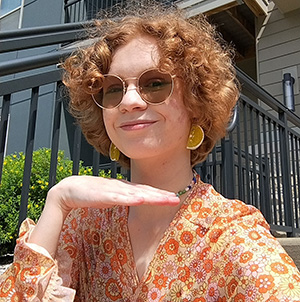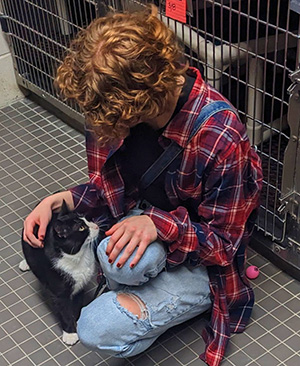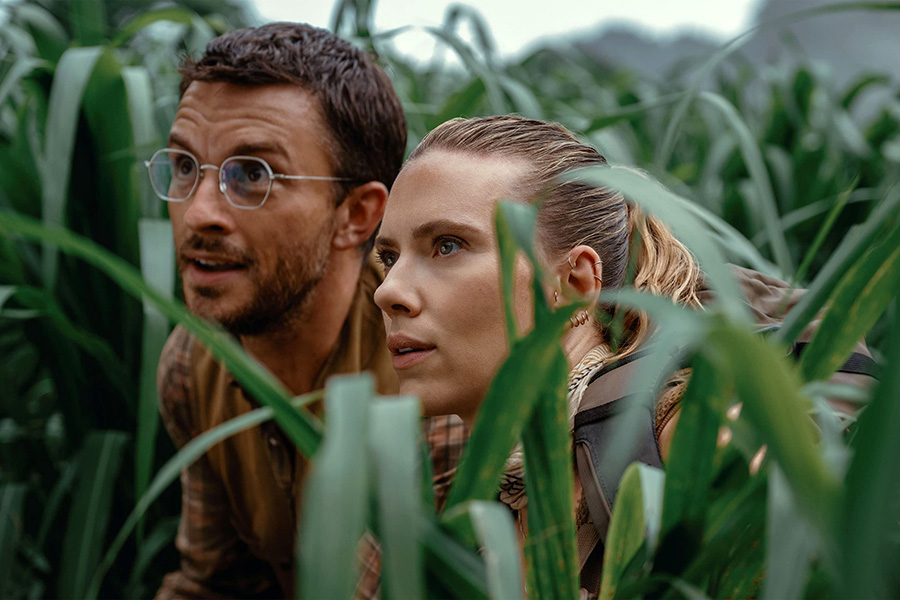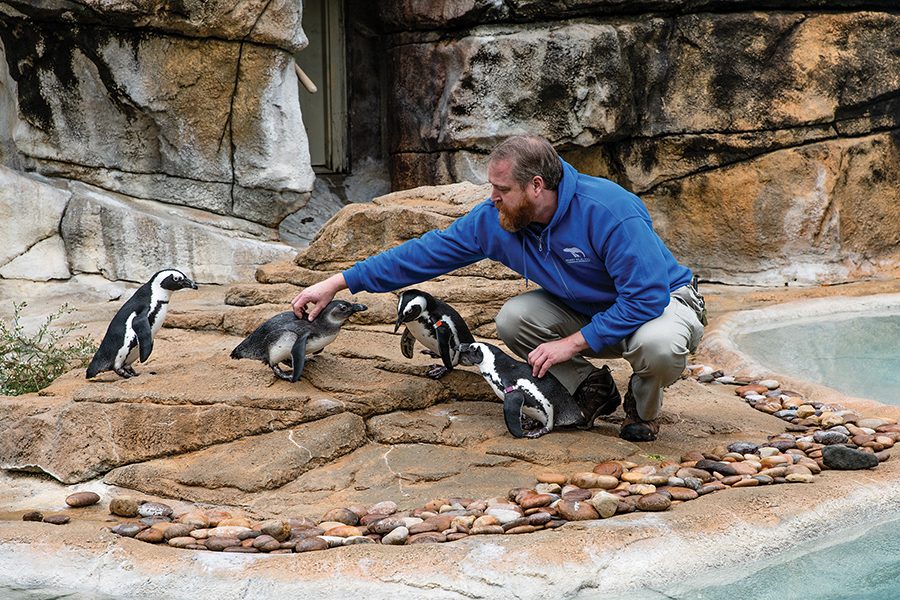What’s it like to be a zookeeper
An inside look at being a zookeeper at Madison’s Henry Vilas Zoo
Gary Hartlage, a zookeeper at Henry Vilas Zoo in Madison, works with the penquins inside their enclosure.
October 16, 2019
I had the pleasure of interviewing Gary Hartlage about his job as a zookeeper at the Henry Vilas Zoo in Madison, so here’s a Q&A to fill you in.
Q: What animal is your favorite to work with? Why do you like them?
A: I have a lot of favorite animals, but one species I have worked with a lot are the African penguins. Before working here, penguins were completely off my radar. They were one that grabbed my attention when I first started here. Penguins aren’t the cuddly animals people think they are.
They all have their own unique personalities, which tends to create a bit of drama. Daily. There’s never a dull moment in the penguin colony.
I’ve also been able to hand rear several penguin chicks over the past 5 years, so they all hold a special place with me. I’ve also gone to South Africa to help out with African penguin conservation efforts.
Q: When did you start working at the zoo? What inspired you to start working here?
A: I started working at the Henry Vilas Zoo in 2003. Prior to that I worked at a small zoo in central Illinois for 5 years. I was inspired to work here back when I was still a student at UW-Stevens Point. I was impressed with not only the variety of animals the zoo had, but the size of the zoo itself, and the fact that it was free admission. This was definitely a zoo I wanted to work for.
Q: What kind of education does a person need in order to be a zookeeper?
A: First and foremost, a college education is required. Some zoos accept an associate’s degree, especially if it is from one of several teaching zoos around the United States. Others require a bachelor’s degree, usually in biology, zoology, or another animal science.
Secondly, a person needs to have hands on experience working with animals. Volunteer positions, internships, part-time work all count for developing the education one receives by doing the actual work, even in a limited capacity.
Zoo keeping positions have a lot of competition, usually one vacant position can have over 200 applicants. The more skills and knowledge you have, the better job you can do to stand out from the competition and get hired.
Q: What tasks do you have as a zookeeper?
A: A zookeeper is a person of many skills. We are chefs: chopping produce, cutting meat, thawing fish, counting crickets/worms, and pulling hay. We are maintenance workers: mowing, weeding eating, tree trimming, cleaning and fixing things. We are educators: keeper chats, informal talks with guests, answering a lot of questions, making a connection between our guests and animals, inspiring people to care about nature. We are care givers: offer food, water, clean up after our animals, give medications, take notes, make and give enrichment, train behaviors, and build relationships with the animals.
We give ourselves to our animals, their needs are more important than our own. We are conservationists: supporting conservation efforts, raising funds, speaking on conservation organizations/ species, working hands on “in the field” when necessary.
Q: Have you ever been in contact with other zoos in Wisconsin, like the Milwaukee County Zoo?
A: Yes. I have friends and former co-workers that work at several of the other Wisconsin zoos. Also, zoos are a huge resource for sharing information. If I have a question, I can reach out to any number of zoos and have multiple responses. We may work at different facilities, but animal care is all of our number one priority. We learn from each other.
Q: What’s your favorite part about working at the zoo?
A: It would have to be developing a relationship with the animals. Taking the time to get to know each animal’s personality, and them getting to know yours. A lot of people think zoo keepers get to cuddle and play with the animals all day, that couldn’t be further from the truth. We may only get to spend a moment or two with them outside of cleaning, feeding, and everything else that goes into a keeper’s day.
Q: When you work, do you take care of one specific species of animals or do you help take care of all of them?
A: The zoo is divided into 16 different areas. Some areas are paired up, others are by themselves. Some areas have two keepers, some only one. The primate and aviary buildings have two keepers in it, and there are two people present when the lions and tigers are being shifted. Other areas usually have one keeper in it, unless someone is being trained. There are some keepers that specialize in certain areas or species. All the areas have a primary keeper that mainly works in that area. As a lead keeper, depending on the day and which keepers have the day off, I can be in any area of the zoo.
Q: What is a typical day look like for you at work?
A: Our day starts at 8 a.m. We start with a morning meeting, going over the report from the day before, discussing updates from the management, maintenance, and education departments. Keepers then go to their assigned areas for the day. We check on all the animals we have been assigned to, if there are any concerns we inform management and the veterinarians. If there are no concerns we start feeding and medicating or getting their outdoor exhibits set up to shift the animals outside (weather permitting). Once our animals are in their exhibits, we start cleaning their overnight areas. This can take several hours. Once cleaning is done, we move on to making diets for either the afternoon, or for the next day. We also provide enrichment, train behaviors, and speak with the public. We may have a Veterinarian come and check on our animals, or we take one to our Animal Health Center for an exam. We also have meetings that vary from areas, specific animals, or the zoo as a whole. We may also have animal feeds, hay, produce, meat, or fish deliveries. Around 3:30 or so, we start getting the areas ready to shift the animals off exhibit and back inside. Usually between 4 p.m. and 5 p.m. we are shifting animals inside. The zoo closes at 5 p.m., and the keepers also finish their day at 5 p.m. Before we leave we enter daily records on the animals in our care.
Q: What advice would you give to someone who is wanting to go into this field of work?
A: Take every opportunity to learn as much as you can. Get that degree! Never stop learning. Attend conferences, workshops, and webinars/online classes. Join student organizations, even ones that may not cover a favorite subject. Learn operant conditioning skills and train your pets. Volunteer at your local zoo. Join the American Association of Zoo Keepers and The Association of Zoos and Aquariums. Get whatever experience you can working with animals: internships at zoos, Humane Society, farm hands, education encounters, petting zoo, work as a vet assistant. This all shows your dedication and passion for this field. You’ll learn something new with each and every experience. This field doesn’t pay much. If you want to be monetarily rich, don’t become a zoo keeper. If you want to be intrinsically rich and rewarded and love your job, become a zoo keeper.





























